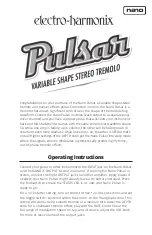
6
Spirit™ AmpMan Series – Manual 1.1
●
6
Cab Type:
This control selects one of the eight cabinet simulations:
No.
Cabinet Types
1
1x12" Modern Thiele Port
2
2x12" Modern Front Port
3
2x12" Vintage Open Back
4
4x10" Alnico Open Back
5
4x12" Vintage Cab
6
4x12" British Cab
7
4x12" Modern Cab
8
4x12" American Cab
Heads up:
AmpMan automatically recalls the Cab Type setting for each
channel. For example, you could choose an open-back cab to add some
sparkly chime to your Channel A clean tone and a 4x12" cab to conjure
a tighter, punchier sound for Channel B. This option of assigning different
cab simulations comes in very handy, especially when using the Red Box:
Simply choose the speaker that suits each channel and tone best.
Heads up, again:
You can use the Red Box and Speaker Out simultaneously,
for example, by connecting an on-stage speaker cabinet to the Speaker Out
and the Red Box to a mixing console. If you do this, please be sure to select
the same Cab Type for both channels, otherwise the cabinet on stage is not
going to sound at all like the signal sent from the Red Box.
●
7
Red Box Mic/Line:
Be sure to set the Red Box to the proper level.
We recommend using the Line setting when running long cables to send
the signal over greater distances, for example, at gigs. The higher output
compensates for the signal level lost along the way. If the mixing console
or soundcard/audio interface lacks XLR inputs, you will need an XLR to 6.3
mm (1/4") jack adapter, which should be readily available in music stores.
Please make sure the Red Box is set to Line when it is connected to 6.3
mm (1/4") jack inputs.
Caution:
Some recording interfaces come with special Hi-Z inputs. These
high-impedance jacks are designed for instrument levels and intended
exclusively for connecting guitars. Do not connect the Red Box to this
type of input. Its higher output levels will saturate it and cause undesirable
distortion.
●
8
Red Box on/off:
When you switch the cabinet emulation off, the Red
Box out sends an unfiltered signal for use with your favorite cabinet and
microphone simulation software or processor.
●
9
Phones:
Connect standard headphones equipped with a 3.5 mm
stereo mini jack plug to this output.
Note:
You can also use this output to feed a line signal to any stereo
multimedia input found on home stereo systems and the like. Your local
dealer should have the proper adapters or cables for this. To connect this
output to a typical stereo sound system's Aux In you will need a cable
with a TRS stereo jack on one end to plug into your AmpMan's Phones
jack and two RCA connectors on the other end to plug into your stereo
sound system's left and right inputs. You can also connect this output to
any mixing desk using a cable with a TRS connector on one end and two
TS mono 6.3 mm (1/4") jack plugs or two XLR connectors on the other.
Be sure to pan the inputs of your desk hard left/right to get the full stereo
effect.
Caution:
These amps are unlike Black Spirit and Spirit Nano series amps in
that their Speaker Out is not muted when you insert a plug into the Phones
jack. The advantage of this circuit design is that it enables you to use the
Phones jack as a variable line out to route the signal to a connected speaker
cabinet. This gives you an alternative to the Red Box with its fixed output
level. To mute the power amp, turn the Master knob all the way down or
operate the AmpMan without a connected cab, in which case you can
leave the Master knob setting where you wish.
●
10
Phones Volume:
Turn this knob to adjust the Phones output’s volume
level.
●
11
Aux In:
You can connect any audio source to the Aux Input. The amp
blends the Aux In signal with your guitar's signal. You can also use it to
connect drum machines or other instruments. The Aux In signal is routed
in full-fledged stereo quality to the Phones jack for you to jam to backing
tracks without having to fuss with an outboard mixer.
●
12
Power:
This button switches your AmpMan on and off.
●
13
AES:
EC Commission Regulation no. 1275/2008 requires electronic
devices to be equipped with a power-saving function that switches off the
device after a specified period of non-use. Your AmpMan does this with a
circuit called AES. The mini switch next to the Power button and Speaker
Out jack enables and disables this auto shutdown feature.
=+*(
VOTZ
> ' VOTZ
AUX IN
PHONES
POWER
NOISE GATE
INPUT
FX LOOP
9L[\YU
:LUK
=VS\TL
VMM
(,:
AE
*HI;`WL
6U
6MM
3PUL
4PJ
1
3
4
6
10
12
14 15
11
7
2
5
9
13
8







































